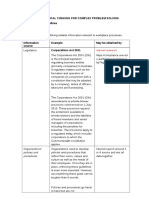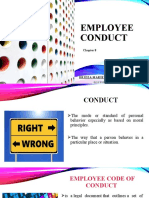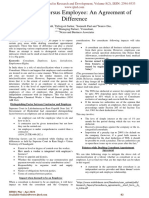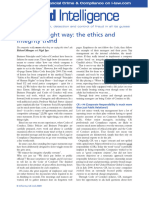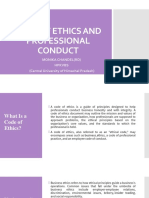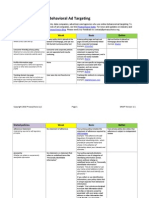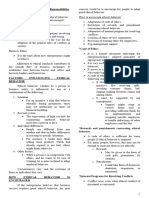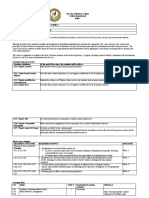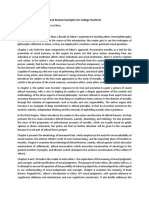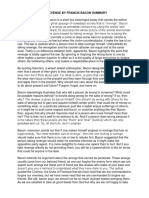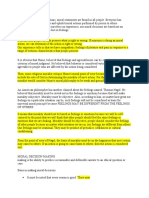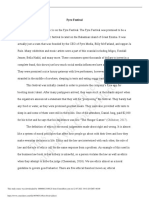0 ratings0% found this document useful (0 votes)
23 viewsLesson 3 4 Bus. Ethics
Lesson 3 4 Bus. Ethics
Uploaded by
Jk DVS1) The document outlines provisions and common practices found in employee codes of conduct, including standards around internet usage, conflicts of interest, maintaining accurate records, and equal opportunity.
2) It discusses potential breaches of an organization's policies, such as failing to comply, as well as employee benefits, entitlements, and required documentation.
3) Maintaining appropriate conduct and observing guidelines are important for the betterment and progression of an organization and its employees.
Copyright:
© All Rights Reserved
Available Formats
Download as DOCX, PDF, TXT or read online from Scribd
Lesson 3 4 Bus. Ethics
Lesson 3 4 Bus. Ethics
Uploaded by
Jk DVS0 ratings0% found this document useful (0 votes)
23 views4 pages1) The document outlines provisions and common practices found in employee codes of conduct, including standards around internet usage, conflicts of interest, maintaining accurate records, and equal opportunity.
2) It discusses potential breaches of an organization's policies, such as failing to comply, as well as employee benefits, entitlements, and required documentation.
3) Maintaining appropriate conduct and observing guidelines are important for the betterment and progression of an organization and its employees.
Original Title
LESSON-3-4-BUS.-ETHICS (1)
Copyright
© © All Rights Reserved
Available Formats
DOCX, PDF, TXT or read online from Scribd
Share this document
Did you find this document useful?
Is this content inappropriate?
1) The document outlines provisions and common practices found in employee codes of conduct, including standards around internet usage, conflicts of interest, maintaining accurate records, and equal opportunity.
2) It discusses potential breaches of an organization's policies, such as failing to comply, as well as employee benefits, entitlements, and required documentation.
3) Maintaining appropriate conduct and observing guidelines are important for the betterment and progression of an organization and its employees.
Copyright:
© All Rights Reserved
Available Formats
Download as DOCX, PDF, TXT or read online from Scribd
Download as docx, pdf, or txt
0 ratings0% found this document useful (0 votes)
23 views4 pagesLesson 3 4 Bus. Ethics
Lesson 3 4 Bus. Ethics
Uploaded by
Jk DVS1) The document outlines provisions and common practices found in employee codes of conduct, including standards around internet usage, conflicts of interest, maintaining accurate records, and equal opportunity.
2) It discusses potential breaches of an organization's policies, such as failing to comply, as well as employee benefits, entitlements, and required documentation.
3) Maintaining appropriate conduct and observing guidelines are important for the betterment and progression of an organization and its employees.
Copyright:
© All Rights Reserved
Available Formats
Download as DOCX, PDF, TXT or read online from Scribd
Download as docx, pdf, or txt
You are on page 1of 4
LESSON 3 activities that slow down our internet
connection (e.g. uploading photos) if
Codes of Right Conduct you’re asked to.
“code of right conduct”. A code has value just 2. Conflict of Interest When you are
experiencing a conflict of interest,
like an internal guideline and an external
your personal goals are no longer
statement of corporate values and
aligned with your responsibilities
commitments. A well-written code of conduct towards us. For example, owning
spells out an organization’s mission, values stocks of one of our competitors is a
and principles, connecting them with conflict of interest. In other cases, you
standards of professional conduct. The code may be faced with an ethical issue. For
expresses the values the organization desires to example, accepting a bribe may
promote in leaders and employees. benefit you financially, but it is illegal
and against our business code of
PROVISIONS OF THE CODE: Code ethics. If we become aware of such
provisions are the exact standards of behavior behavior, you will lose your job and
and performance expectations that an may face legal trouble.
organization selects to emphasize and tackle in
the code.
Compliance, Accuracy of corporate
Integrity and Anti- finances and financial
corruption reporting Employee
records and expense
reports Bribes
Political
contributions.
Conflicts of Interest Gifts and gratitude COMMON PRACTICES IN BUSINESS
Political activity ORGANIZATIONS
Family members.
Employee, Client Maintaining records CONDITIONS There are a
and Vendor of and information INCLUDED IN number of
Information Privacy and POLICIES different
confidentiality conditions of
Disclosure of employment that
information. may not be
Employment Equal opportunity prescribed by
Practices Diversity Incentives law, but which is
and recognition. agreed to by the
Internet, Social Internet and social employer and the
Networking and network use at work employee at the
Social Media Prohibited sites and commencement
content Policies of the
regarding posts about employment
company, work contract. Some
products or companies issue
coworkers. policies on such
matters so that
employees are
EMPLOYEE CODE OF CONDUCT clear on what
their rights and
1. Internet Usage Our corporate internet
responsibilities
connection is primarily for business.
are. Conditions
But you can occasionally use our
which may fall
connection for personal purposes as
into this category
long as they don’t interfere with your
include:
job responsibilities. Also, we expect
absenteeism,
you to temporarily halt personal
training,
promotion, into this category
probation, include: company
performance car, mobile phone
review, (including private
abandonment of use), employee
employment, exit assistance
interviews, programs, salary
termination of packaging, career
employment. breaks, and study
EMPLOYEE There are benefit assistance.
ENTITLEMENTS entitlements BREACH OF A breach occurs
which employees ORGANIZATION’S when one party
accumulate as a POLICY in a binding
result of the agreement fails to
rendering of their deliver according
services to an to the terms of
employer up to the agreement.
the reporting date For example,
and include, but failure to comply
are not limited to, with the
wages and employers’
salaries policies can be a
(including non- valid reason for
monetary termination of
benefits). These employment.
entitlements also DECORUM In ordinary
include: English, this
redundancy pay, word is used to
annual leave, mean the
long service appropriate
leave, parental conventions of
leave, dress and
personal/career’s conduct required
leave, special in specific
leave, vacation situations. The
leave, jury service word “office
and overtime decorum” might
pay. sound heavy and
EMPLOYEE An employer loaded with
may provide a many
number of complexities but
different in reality it is a set
BENEFITS benefits as part of of simple rules
their contract of which you need
employment. to observe while
Sometimes working together
incentives aimed in an
at increasing organization. An
productivity and employee needs
with the intention to observe certain
of attracting and guidelines for the
retaining betterment and
competent and progression of the
qualified office/employees.
employees. REPORTORIAL Most jobs require
Employee REQUIREMENT writing – e-mails,
benefits that fall AND letters, memos,
DOCUMENTATIO reports, analyses, Plato was famous for his discussions on the
N project subject of reality. He believed that
summaries, everything was founded in perception and
product the physical world is the lesser world in
descriptions, and every way. He believed that most of the
the list goes on. greater world was not clear. He hated people
The ability to who place all their faith in physical senses
write well is and not in their intellectual senses for the
essential in intention of collecting insight. “More will be
obtaining a job, in accomplished, and better, and with more
performing the ease, if every man does what he is best fitted
job, and in being to do, and nothing else.” According to Plato,
promoted. each social class must happily perform the
Business reports function for which it is 27 suited like the
can save time and philosopher rules, the warrior fights and the
money, and play worker enjoys the fruits of his labor.
a dramatic role in
the future of your D. ARISTOTLE’S PHILOSOPHY: LET
company PEOPLE SEEK FULFILLMENT
Aristotle remains relevant because he is
chiefly interested in ethical principles of
leadership. Contained in his Nicomachean
LESSON 4 Ethics, Aristotle established that the role of
CLASSICAL PHILOSOPHIES USED IN the leader is someone who must construct an
BUSINESS environment in which all members of an
A. CONFUCIUS’ PHILOSOPHY: organization have the chance to recognize
LIVE A CONTENTED, MORAL AND their own potential. He says that the ethical
HAPPY LIFE. role of the leader is the establishment of the
Virtue and morality are Confucius’ primary conditions under which followers can attain
focus. He is concerned with teaching people their full potential and to enhance his own
about benevolence, generosity, love, power. Aristotle was a great biologist as well
compassion, and sincerity in a as a great philosopher. He based his ethics
straightforward manner. He concentrated on on a psychological theory of human nature,
developing morality and a sense of shame so claiming that people are by nature virtuous,
people will conduct themselves in rational, social and happiness-seeking.
harmonious ways. He also emphasized that E. . EPICURUS’ PHILOSOPHY: THE
in order to govern, one must govern ART OF HAPPINESS
themselves. Epicurus makes a significant distinction
B. SOCRATES’ PHILOSOPHY: HAVE between necessary and unnecessary desires.
THE COURAGE TO DISAGREE. Necessary desires are those which are
Socrates equated knowledge with virtue, essential to generate happiness, like desiring
which eventually leads to ethical conduct. to get rid of bodily pain, or desiring a state of
He believed that the only life worth living inner peace. Only when people are in pain
was one that was carefully examined. He do they sense the necessity to look for
looked for principles and actions that were pleasure, a need which certainly only
worth living by, creating an ethical base produces greater pain. Getting rid of this
upon which decisions should be made. pain-pleasure-pain cycle, people need to
Socrates definitely believed that knowledge cultivate a mindset in which there is no pain.
and understanding of virtue, or “the good,” Therefore, the intention of is not the positive
was enough for someone to be happy. To quest of pleasure. The aim is rather the
him, knowledge of the good was almost reaching of an impartial condition which is
similar to an enlightened state. He believed best described as “peace of mind”. The
that no person could willingly decide to do Greek word which Epicurus uses for this
something damaging or harmful if they were state is “ataraxia”, which plainly means
completely aware of the value of life. “freedom from worry”.
C. . PLATO’S PHILOSOPHY: THE F. PLUTARCH’S PHILOSOPHY: BE A
POWER TO RULE GOOD ROLE MODEL
Plutarch understood that humans are
exceptionally social creatures, who always
watch the people around them and emulate
them. According to him, people
unfortunately, were often influenced by bad
role models surrounded to them. However,
people can be guided by providing them
with better patterns to imitate. The aim of his
book entitled Parallel Lives was mainly
ethical. He strongly believed that if young
people learn the lives of great heroes, and are
trained to reflect on their virtues and flaws,
they will obviously try to be like them and
use them as role models. Plutarch suggests
that people can consciously choose their role
models, in order to cultivate the best sides of
their character, rather than the worst.
G. EPICTETUS’ PHILOSOPHY: BUILD
A FLEXIBLE MINDSET
Epictetus insisted that, though life may be
subject to constant change, human beings are
in the end in charge for how they understand
and react to those changes. He made
emphasis on the superiority of the individual
over circumstance. According to Epictetus, in
order to cope with insecurity, a person must
constantly remind himself what he could
control and what he couldn’t. People can
control their thoughts, beliefs and attitudes,
but everything else is 30to some extent out of
one’s control like other people’s perceptions
and behavior, the economy, the weather, the
future and the past.
H. MUSONIUS’ PHILOSOPHY: KEEP
TRACK OF ONE’S ETHICAL
PROGRESS
Gaius Musonius’ Rufus held that since a
human being is made of body and soul,
people should train both, but the latter
demands greater attention. He believed that
the soul is similarly strengthened by
developing courage through enduring
hardships, and by making it self-controlled
through abstaining from pleasures. He also
argued that since people acquire all good
things by pain, the person who refuses to
endure pain is someone who condemns
himself to not being worthy of anything
good. Lastly, he believed that if people want
to be an ethical individual or an ethical
company, they cannot just study ethics; they
have to practice it, every day, to get into
good habits.
You might also like
- BSBCRT611 Task 1 GuidelinesDocument13 pagesBSBCRT611 Task 1 GuidelinesAlessandro Fonseca100% (3)
- Character Traits and Filipino ValuesDocument13 pagesCharacter Traits and Filipino ValuesSu Kings Abeto100% (1)
- CHAPTER I Soil Analysis and NPK DetectionDocument12 pagesCHAPTER I Soil Analysis and NPK DetectionJk DVSNo ratings yet
- GE 108 Module 1Document6 pagesGE 108 Module 1Joribelle AranteNo ratings yet
- Force Automotive Breach of Code of Conduct: Case Study by Group 9Document7 pagesForce Automotive Breach of Code of Conduct: Case Study by Group 9manik singhNo ratings yet
- Employsure Eguide Employment Contracts and Legislations 2017.compressed-1Document31 pagesEmploysure Eguide Employment Contracts and Legislations 2017.compressed-1staceywalker.coNo ratings yet
- Worldwide Telecommunications Companies Code of Ethics ComparisonDocument4 pagesWorldwide Telecommunications Companies Code of Ethics ComparisonAlonso DlcNo ratings yet
- GWL Code of Conduct enDocument18 pagesGWL Code of Conduct enKristian GjoniNo ratings yet
- M2 - 01 - Overview of Different Forms of BusinessDocument8 pagesM2 - 01 - Overview of Different Forms of BusinessDiptendu RoyNo ratings yet
- Worksheet 3Document4 pagesWorksheet 3Maricar LigtasNo ratings yet
- Establishment of A BusinessDocument11 pagesEstablishment of A BusinessWilliam MushongaNo ratings yet
- Types of Business Etiquette - BizfluentDocument5 pagesTypes of Business Etiquette - BizfluentMalik MuhammadNo ratings yet
- Task 1 v8Document3 pagesTask 1 v8Qasim YousafNo ratings yet
- LONDON-A Guide To Hiring and Firing in EstoniaDocument8 pagesLONDON-A Guide To Hiring and Firing in EstonianishinhussankuttyNo ratings yet
- Kenneths Report Ce LawsDocument8 pagesKenneths Report Ce LawsKenneth E. FerreriaNo ratings yet
- (New) 12 BIL Code of Ethics - 13 04 14Document13 pages(New) 12 BIL Code of Ethics - 13 04 14Dolly ThoguruNo ratings yet
- Defining Business Ethics: Afterwork AssessmentDocument12 pagesDefining Business Ethics: Afterwork AssessmentPamela Rose CasenioNo ratings yet
- Chap2 Part 1 Extracted Pages From Business Ethics Now - by Andrew Ghillyer - 5th Ed-McGraw-Hill-2013Document11 pagesChap2 Part 1 Extracted Pages From Business Ethics Now - by Andrew Ghillyer - 5th Ed-McGraw-Hill-2013phuonganhvu0310No ratings yet
- Exploring The Iesba Code: Installment 6: Conflicts of InterestDocument2 pagesExploring The Iesba Code: Installment 6: Conflicts of InterestElena PanainteNo ratings yet
- OrganizationDocument11 pagesOrganizationTalha IbrahimNo ratings yet
- Yellow Corporate Construction Services Company BrochureDocument2 pagesYellow Corporate Construction Services Company BrochurekashifmasoodkmkNo ratings yet
- Assignment 1Document2 pagesAssignment 1kashifmasoodkmkNo ratings yet
- PE Project - 719 To 724 - Retail & E-CommerceDocument15 pagesPE Project - 719 To 724 - Retail & E-CommercejaishitaNo ratings yet
- Employee Conduct: Driz Z A M Arie A. Arane TaDocument15 pagesEmployee Conduct: Driz Z A M Arie A. Arane TaDrizza Marie AranetaNo ratings yet
- Ethical Climate: By: Syndicate 7Document12 pagesEthical Climate: By: Syndicate 7Anthony KwoNo ratings yet
- IJTRD22567Document6 pagesIJTRD22567Prashant PatankarNo ratings yet
- Assessment Task 1 Written QuestionsDocument12 pagesAssessment Task 1 Written QuestionsClaire Caballero GabrielNo ratings yet
- CHAPTER 3 Corpo GovDocument4 pagesCHAPTER 3 Corpo GovHazel DimaanoNo ratings yet
- IBM Code of Conduct Analysis.Document4 pagesIBM Code of Conduct Analysis.KeybateNo ratings yet
- m1l4 Employee Lifecycle - ScriptDocument8 pagesm1l4 Employee Lifecycle - ScriptKakaNo ratings yet
- Moonlighting Legality and EthicsDocument4 pagesMoonlighting Legality and EthicsMuskaan SinhaNo ratings yet
- Entrep Mod 2 TransesDocument15 pagesEntrep Mod 2 TransesDaniel JaymeNo ratings yet
- Supplier Guiding Principles: Values and Commitments at The Coca Cola CompanyDocument2 pagesSupplier Guiding Principles: Values and Commitments at The Coca Cola CompanyTrieuLuongHaiNo ratings yet
- Business Ethics ReviewerDocument2 pagesBusiness Ethics ReviewerClamonte, Marnie ShynneNo ratings yet
- What Are The Pros and Cons To Having ADocument2 pagesWhat Are The Pros and Cons To Having AKENNEDY VAGAYNo ratings yet
- Hello, From Compliance!Document1 pageHello, From Compliance!sonihimanshu1403No ratings yet
- Employee NdaDocument6 pagesEmployee NdaAnonymous L1nX8Cn5100% (1)
- 04 Handout 1Document3 pages04 Handout 1Katelyn Mae SungcangNo ratings yet
- Business Ethics Definition: Theory Summary and Mini Case DiscussionDocument17 pagesBusiness Ethics Definition: Theory Summary and Mini Case DiscussionSarah Shahnaz IlmaNo ratings yet
- LABOR RIGHTS - From LA TabinganDocument19 pagesLABOR RIGHTS - From LA TabinganPhilip AmelingNo ratings yet
- Workplace Ethics: Factors Influencing Ethical Behaviour at WorkDocument7 pagesWorkplace Ethics: Factors Influencing Ethical Behaviour at WorkMaheswar SethiNo ratings yet
- Common Practices in BusinessDocument16 pagesCommon Practices in BusinessMichelle DoctorNo ratings yet
- 4. Integrity TrendDocument4 pages4. Integrity TrendALPENGIRLNo ratings yet
- Buyer's Guide For Simplifying Payroll + HRDocument20 pagesBuyer's Guide For Simplifying Payroll + HRMostafa MosalmNo ratings yet
- Code of ConductDocument34 pagesCode of ConductSRIRAM BALDWANo ratings yet
- CODE OF ETHICS AND PROFESSIONAL CONDUCT Day 5Document55 pagesCODE OF ETHICS AND PROFESSIONAL CONDUCT Day 5Monika ChandelNo ratings yet
- Understanding Business Ethics and Legal Challenges in EntrepreneurshipDocument11 pagesUnderstanding Business Ethics and Legal Challenges in EntrepreneurshipkelNo ratings yet
- Vicarious Liability SlidesDocument27 pagesVicarious Liability SlidesKelvine Demetrius100% (1)
- Company Policies PresentationDocument25 pagesCompany Policies Presentationsara khaled0% (1)
- Corporate Governance and Business EthicsDocument20 pagesCorporate Governance and Business EthicsLebohang Mofokeng DavidNo ratings yet
- This Study Resource Was: Simran Arora Professor Rudolph MGT 424 November 17, 2019 Case Study 2 2G RoboticsDocument5 pagesThis Study Resource Was: Simran Arora Professor Rudolph MGT 424 November 17, 2019 Case Study 2 2G RoboticsAryan GargNo ratings yet
- Privacy Checklist For Behavioral Targeting - Draft Version 1.1Document9 pagesPrivacy Checklist For Behavioral Targeting - Draft Version 1.1privacychooserNo ratings yet
- CodeDocument21 pagesCodeAyush RajputNo ratings yet
- Step 4Document8 pagesStep 4samwiseNo ratings yet
- Ethical Issues in BusinessDocument1 pageEthical Issues in Businessسجى راميNo ratings yet
- 02 Task Performance 3Document4 pages02 Task Performance 3Allyza RenoballesNo ratings yet
- What Are The Assessment of Non Quantifiable Impact?: Fairness Among StakeholdersDocument13 pagesWhat Are The Assessment of Non Quantifiable Impact?: Fairness Among Stakeholdersauni fildzahNo ratings yet
- Chapter 3 - Entrep - Ethical and Social ResponsibilitiesDocument4 pagesChapter 3 - Entrep - Ethical and Social ResponsibilitieslulunanjohndellNo ratings yet
- 6.4 Reading - Workplace Responsibilities and RightsDocument6 pages6.4 Reading - Workplace Responsibilities and RightsRahNo ratings yet
- Ethical DilemaDocument13 pagesEthical DilemaariNo ratings yet
- BSBHRM412 Support Employee and Industrial Relations (Release 1) - 2Document30 pagesBSBHRM412 Support Employee and Industrial Relations (Release 1) - 2Umar AliNo ratings yet
- BE Unit 10Document17 pagesBE Unit 10ISHAAN SHETTY100% (1)
- Business Ethics For The Modern Man: Understanding How Ethics Fit Into The Business PlaceFrom EverandBusiness Ethics For The Modern Man: Understanding How Ethics Fit Into The Business PlaceNo ratings yet
- Bus. Ethics Actitivity For Lesson 1 and 2Document2 pagesBus. Ethics Actitivity For Lesson 1 and 2Jk DVSNo ratings yet
- Chapter 2Document3 pagesChapter 2Jk DVSNo ratings yet
- Kids Nook Chapters 1 3 October 11 2021Document56 pagesKids Nook Chapters 1 3 October 11 2021Jk DVSNo ratings yet
- Educ 525 Assignment 2 Ethics - Ahmad Bird Moorhouse NG ZhengDocument12 pagesEduc 525 Assignment 2 Ethics - Ahmad Bird Moorhouse NG Zhengapi-582822243No ratings yet
- Chapter IIIDocument9 pagesChapter IIIZirumi DauzNo ratings yet
- Filipino Values (Week 5)Document11 pagesFilipino Values (Week 5)Princess Chovi AcebisNo ratings yet
- An Ethic of Care in Nursing: Past, Present and Future ConsiderationsDocument13 pagesAn Ethic of Care in Nursing: Past, Present and Future Considerationsyurdin MusniarNo ratings yet
- V20 Pander NPCDocument1 pageV20 Pander NPCAhmet Burak KeçeciNo ratings yet
- Ifp001 Midterm PDFDocument4 pagesIfp001 Midterm PDFMessiyah C. CalambaNo ratings yet
- ACTIVITY 1 - B-Comparingcontrasting The Different Branches of Philosophy - BANTICEL SDocument1 pageACTIVITY 1 - B-Comparingcontrasting The Different Branches of Philosophy - BANTICEL SShun Dee LebicoNo ratings yet
- Ethics SyllabusDocument9 pagesEthics SyllabusJessa GallardoNo ratings yet
- Individualism vs. CollectivismDocument4 pagesIndividualism vs. CollectivismNGITPANo ratings yet
- Finals BioethicsDocument21 pagesFinals BioethicsGuenevere Damasin100% (1)
- Utilitarianism & Related Concepts: Sub: Ethics & CSR By: Akanksha RawatDocument28 pagesUtilitarianism & Related Concepts: Sub: Ethics & CSR By: Akanksha RawatVandana Řwţ100% (1)
- Module 5Document5 pagesModule 5Bunduquin, Angelica Anne A.No ratings yet
- GE7-Ethics Module-6Document6 pagesGE7-Ethics Module-6Jess Sy GooNo ratings yet
- Book Review Examples For College School StudentsDocument3 pagesBook Review Examples For College School StudentsChu LinNo ratings yet
- Of Revenge by Francis BaconDocument2 pagesOf Revenge by Francis BaconJeyarajan100% (1)
- Gen Ed 8 - EthicsDocument2 pagesGen Ed 8 - EthicsRomina NicolasNo ratings yet
- 05 DeontologyDocument29 pages05 DeontologyAnne MiguelNo ratings yet
- Ethics 9module)Document53 pagesEthics 9module)Sheila Mae AsuelaNo ratings yet
- Besr 12 Week 7 Quarter 4Document6 pagesBesr 12 Week 7 Quarter 4Melben ResurreccionNo ratings yet
- This Study Resource Was: Fyre FestivalDocument6 pagesThis Study Resource Was: Fyre FestivalElaine Joyce GarciaNo ratings yet
- Topic 1 Business EthicsDocument7 pagesTopic 1 Business EthicsBarangay Dacal-la FuguNo ratings yet
- Assignment 2Document3 pagesAssignment 2ASHNo ratings yet
- Q1 G12 - TOS and Answer Key Stage 4 - Business Ethics and Social ResponsibilityDocument2 pagesQ1 G12 - TOS and Answer Key Stage 4 - Business Ethics and Social ResponsibilityRichee CletNo ratings yet
- CRIM4 Module1Document7 pagesCRIM4 Module1Mher Buenaflor100% (1)
- Kant'S Non-Consequentialist Ethics: Do Your DutyDocument11 pagesKant'S Non-Consequentialist Ethics: Do Your DutytitelNo ratings yet
- The Land EthicDocument2 pagesThe Land EthicKitha Rae ButaNo ratings yet
- The Classical Philosopher and Their PhilosophiesDocument6 pagesThe Classical Philosopher and Their PhilosophiesKen SugiyamaNo ratings yet
- Indore Institute of Law Research TopicDocument21 pagesIndore Institute of Law Research Topicsakshi AgrawalNo ratings yet
